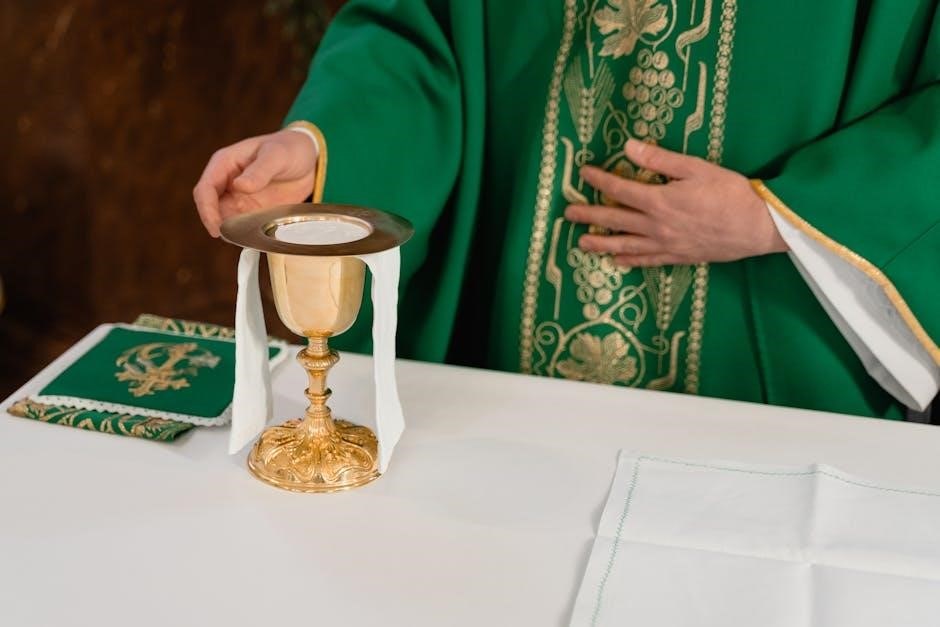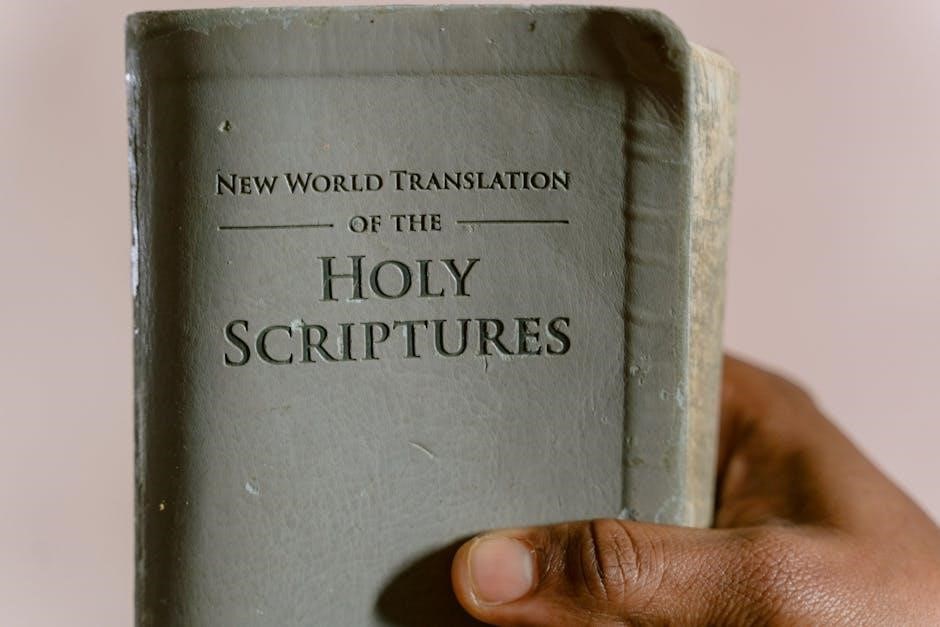catholic bible study workbook pdf
Catholic Bible study is a transformative journey into Scripture, rooted in faith and Tradition. Workbooks like the Catholic Bible Study Workbook provide structured guidance, fostering deeper understanding and spiritual growth through guided reflections, scriptural context, and theological insights.
Overview of Catholic Bible Study
Catholic Bible study is a sacred endeavor that seeks to deepen one’s understanding of Scripture through faith and Tradition. It involves exploring the Bible in harmony with Church teachings, using resources like workbooks, commentaries, and guided reflections. These tools help participants navigate complex passages, providing historical and theological context. Many workbooks, such as the Catholic Bible Study Workbook, offer structured lessons, study questions, and prayer prompts to enhance engagement. Whether undertaken individually or in groups, Catholic Bible study fosters spiritual growth, strengthens faith, and builds community. It encourages believers to apply Scriptural truths to daily life, integrating prayer and reflection for a holistic approach to studying God’s Word.
Purpose of a Workbook in Bible Study
A Catholic Bible study workbook serves as a practical guide, offering structured lessons and resources to enhance Scripture engagement. Its purpose is to provide a systematic approach, helping learners delve into biblical texts with clarity and depth. Workbooks often include study questions, reflections, and theological insights, fostering a deeper connection with God’s Word. They also facilitate personal or group study, allowing participants to apply Scriptural teachings to their lives. By integrating prayer and faith, workbooks become invaluable tools for spiritual growth, ensuring that Bible study is both informative and transformative. This structured approach helps individuals and communities embrace the richness of Catholic Tradition while nurturing their faith journey through active participation and contemplation.
Importance of Bible Study in Catholicism
Bible study enriches faith, deepens Scriptural understanding, and fosters prayer, enabling Catholics to live their faith authentically and grow in communion with God and His Church.
Spiritual Growth Through Scripture
Engaging with Scripture is a cornerstone of spiritual growth in Catholicism, fostering a deeper relationship with God and His divine plan. Through guided reflections and prayerful study, Catholics can encounter Christ in the Word, gaining insights that nourish the soul. Workbooks like the Catholic Bible Study Workbook provide structured tools to explore Sacred Scripture, helping individuals apply its teachings to daily life. Regular study cultivates a habit of prayer, reflection, and discernment, leading to a more vibrant faith. This spiritual journey not only enriches personal devotion but also strengthens communal worship and service. By immersing oneself in the Bible, Catholics can grow in holiness, love, and fidelity to God’s will, ultimately living as joyful disciples of Christ.
Deepening Faith and Understanding
Studying the Bible through a Catholic Bible Study Workbook enriches one’s faith by connecting scriptural truths with the teachings of the Church. These workbooks often include commentary, study questions, and reflections that align with Catholic doctrine, ensuring a comprehensive understanding of God’s Word. By exploring the historical and cultural contexts of Scripture, participants gain a deeper appreciation for the unity of the Bible and its relevance to their lives. This approach not only strengthens theological knowledge but also helps bridge the gap between faith and daily experiences, fostering a more integrated and meaningful spiritual life. Through such study, Catholics can develop a firmer grasp of their faith, leading to a more confident and joyful witness of Christ in the world.

Choosing the Right Workbook
Selecting a workbook aligned with Catholic doctrine ensures a faithful and enriching study experience. Look for structured content, reflections, and scriptural insights to deepen understanding and application.
Theological Alignment with Catholic Doctrine
Ensuring theological alignment with Catholic doctrine is crucial for a workbook to be effective. A workbook that adheres to the Church’s teachings provides a solid foundation for study, helping participants understand Scripture within the Catholic Tradition. It should incorporate official Church documents, such as the Catechism, and reflect the magisterial teachings. This alignment ensures that the study material not only educates but also nourishes the faith, fostering a deeper connection to the Church’s beliefs and practices. By using a workbook that is theologically sound, participants can confidently engage with Scripture, knowing they are guided by authentic Catholic principles and insights.
Structure and Content Considerations
A well-structured Catholic Bible study workbook is essential for effective learning. It should organize lessons logically, providing clear sections for reflection, discussion, and application. Content should include guided reflections, study questions, and scriptural references, ensuring a comprehensive understanding of the Bible. Practical elements like prayer prompts and space for personal notes enhance engagement. The workbook should balance theological depth with accessibility, catering to both group and individual study. A clear layout and concise explanations help participants navigate complex themes, while supplementary materials like timelines or maps enrich the study experience. Ultimately, the structure and content should foster a deeper connection to Scripture and its relevance in daily life, making the workbook a valuable tool for spiritual growth and faith formation.

Key Features of a Catholic Bible Workbook
A Catholic Bible workbook should include guided reflections, study questions, and scriptural context to deepen understanding. It should also provide theological insights and practical applications for daily life.
Guided Reflections and Study Questions
Guided reflections and study questions in a Catholic Bible workbook are essential for fostering a deeper connection with Scripture. These elements encourage learners to engage actively with the text, prompting personal prayer and contemplation. Reflections often focus on applying biblical teachings to daily life, while study questions help clarify meanings and reinforce key themes. By incorporating these tools, workbooks facilitate a holistic understanding of Catholic teachings and their relevance to modern life. Such structured guidance ensures that participants can delve into the richness of Scripture while remaining grounded in Catholic Tradition and doctrine. These features make a workbook an invaluable resource for both individual and group study settings.
Scriptural References and Contextual Insights
Scriptural references and contextual insights in a Catholic Bible workbook enhance understanding by providing historical, cultural, and theological background. These elements help learners grasp the nuances of biblical passages, linking them to Catholic doctrine and Tradition. By offering detailed explanations and cross-references, workbooks ensure that readers can appreciate the depth and richness of Scripture. Contextual insights often include explanations of ancient customs, theological themes, and the Church’s teachings, making the Bible more accessible and relevant. This approach not only aids in comprehension but also strengthens the connection between faith and daily life, fostering a more profound appreciation of God’s Word.

How to Use the Workbook Effectively
Engage consistently, set achievable goals, and reflect prayerfully. Use guided questions to deepen understanding, and integrate insights into daily life for spiritual growth and renewal.
Starting a Bible Study Group
Starting a Catholic Bible study group begins with prayer and planning. Gather a small, committed group of individuals eager to deepen their faith. Choose a workbook like the Catholic Bible Study Workbook that aligns with Catholic doctrine and offers structured lessons. Set a consistent schedule and venue to foster accountability and community. Begin with an introductory session to outline goals and expectations. Encourage active participation through guided reflections and open discussions. Incorporate prayer and worship to create a sacred atmosphere. Utilize online resources or study guides for additional insights. Rotate leadership roles to empower members and share responsibilities. Celebrate milestones and progress to keep the group motivated. Remember, the goal is to foster spiritual growth, communion, and a deeper understanding of Scripture together.
Personal Study Habits and Practices
Personal Catholic Bible study thrives on consistent habits and meaningful practices. Begin each session with prayer, asking the Holy Spirit for guidance and clarity. Use a workbook like the Catholic Bible Study Workbook to guide your study, ensuring alignment with Catholic teachings. Set aside a dedicated time and space for study, free from distractions. Reflect deeply on each passage, noting insights and questions. Engage in lectio divina, slowly pondering the Word of God. Apply the teachings to your daily life, seeking to live out the Gospel. Consistency is key—commit to regular study, even if brief. End your session with prayer, thanking God for His Word and seeking His will. Personal study fosters intimacy with Scripture and deepens your relationship with Christ.

Popular Catholic Bible Study Workbooks
Popular workbooks include the Come and See Catholic Bible Study series and The Great Adventure Bible Studies. These guides offer structured lessons, deep scriptural insights, and reflection questions, aligning with Catholic doctrine and fostering spiritual growth. Widely used for both group and personal study, they are available online and in Catholic bookstores, providing accessible tools for meaningful Bible exploration and faith enrichment.
Recommended Workbooks for Group Study
For group study, The Great Adventure Catholic Bible Studies and Unlocking the Mystery of the Bible are highly recommended. These workbooks provide structured lessons, fostering engaging discussions and a deeper understanding of Scripture. Come and See Catholic Bible Study series is another excellent choice, offering detailed commentaries and reflection questions to enrich group learning. These resources are widely available online or in Catholic bookstores, making them accessible for parish groups or informal gatherings. Their clear format and alignment with Catholic doctrine ensure a comprehensive and enriching experience, helping participants connect faith with daily life while fostering community and shared spiritual growth through collaborative study.
Where to Find Reliable Study Materials
Reliable Catholic Bible study materials, including workbooks, can be found through trusted sources like the United States Conference of Catholic Bishops (USCCB) website, which offers articles and study guides. Catholic bookstores and online retailers like Amazon carry a variety of workbooks, such as The Great Adventure Catholic Bible Studies and Come and See Catholic Bible Study series. Additionally, publishers like Ignatius Press and Our Sunday Visitor provide high-quality resources. Many parishes and diocesan websites also recommend and sell approved study materials. These sources ensure alignment with Catholic doctrine and provide enriching tools for both personal and group study, fostering a deeper connection with Scripture and faith.

Tips for Effective Bible Study
- Use a Catholic Bible study workbook for structured guidance.
- Set achievable goals for daily or weekly study.
- Integrate prayer and reflection to deepen understanding.
- Engage with guided questions and commentary for insights.
- Stay consistent to foster spiritual growth and familiarity with Scripture.
Integrating Study into Daily Life
Integrating Catholic Bible study into daily life enriches faith and provides practical wisdom. Use a Catholic Bible study workbook to reflect on Scripture during commutes or breaks. Incorporate daily reflections and prayer prompts from the workbook to connect biblical teachings with real-life challenges. Share insights with family or friends to reinforce learning and inspire others. Consistency is key—dedicate a specific time each day for study, even if brief. This habit fosters a deeper relationship with God and applying His Word in everyday decisions. By weaving Scripture into routines, Catholics can live out their faith more intentionally, finding peace and guidance in God’s Word.
Using Prayer and Reflection in Study
Prayer and reflection are essential components of Catholic Bible study, fostering a deeper connection with God. Begin each study session with prayer, asking the Holy Spirit for guidance and clarity. Use guided reflections from a Catholic Bible study workbook to focus on key verses and their application to daily life. Reflect on how Scripture speaks to personal experiences and faith journey. end each session with prayer, thanking God for insights and seeking grace to live His Word. This practice cultivates a spiritual rhythm, transforming study into a sacred dialogue with God. By integrating prayer and reflection, Catholics can encounter Christ more profoundly in Scripture and grow in holiness.

Common Challenges and Solutions
Catholic Bible study can be intimidating due to the Bible’s complexity. Using a workbook helps overcome this by providing structured guidance and clarity, making study manageable and fruitful.
Overcoming Initial Intimidation
Starting a Catholic Bible study can feel overwhelming due to the complexity of Scripture. A workbook like the Catholic Bible Study Workbook simplifies this journey by offering structured guidance. It breaks down the Bible into manageable sections, providing clear explanations and reflection questions. Beginners often find comfort in the workbook’s step-by-step approach, which eliminates confusion and builds confidence. The inclusion of theological insights and contextual background helps learners grasp difficult passages. Additionally, the workbook encourages prayer and reflection, transforming study into a spiritual practice. By starting small and staying consistent, individuals can gradually deepen their understanding and connection with God’s Word. This approach fosters a sense of accomplishment and motivation, making Bible study accessible and fulfilling for all.
Maintaining Consistency in Study
Maintaining consistency in Catholic Bible study requires discipline and intentional habits. A workbook like the Catholic Bible Study Workbook provides a structured format, helping learners stay on track. Setting aside a specific time each day or week creates a routine, ensuring steady progress. The workbook’s guided reflections and study questions encourage regular engagement, while its theological insights offer motivation. Incorporating prayer before each session helps focus the mind and heart. Tracking progress through completed lessons and reflecting on milestones fosters a sense of accomplishment. Consistency also grows through accountability, such as joining a study group or sharing insights with others. By prioritizing study and staying committed, individuals deepen their faith and nurtures a lifelong relationship with Scripture.

Benefits of Group Bible Study
Group Bible study fosters community, shared learning, and mutual support. Workbooks like the Catholic Bible Study Workbook provide structured content, enhancing understanding and fostering active participation among members.
Fostering Community and Shared Learning
Group Bible study creates a vibrant community where participants share insights, experiences, and faith. Using resources like the Catholic Bible Study Workbook, members engage in collaborative learning, fostering deeper connections and mutual understanding. The structured content encourages active participation, allowing individuals to contribute their perspectives while learning from others. This shared environment enriches personal comprehension of Scripture and strengthens communal faith. Regular discussions and reflections help build trust and camaraderie, transforming the group into a supportive spiritual family. By exploring the Bible together, participants not only gain theological knowledge but also experience the joy of collective growth in their Catholic faith.
Enhancing Understanding Through Discussion
Digital tools and online platforms have revolutionized Catholic Bible study, offering accessible resources and connecting learners worldwide. Utilizing Catholic Bible Study Workbook PDFs, participants can engage with interactive content, such as guided reflections and study questions, which enhance comprehension of Scripture. Online study communities provide spaces for collaborative learning, where individuals can share insights and gain diverse perspectives. These digital resources not only facilitate deeper engagement with the Bible but also foster a sense of unity among Catholics globally. By leveraging technology, Bible study becomes more dynamic and inclusive, ensuring that everyone can participate and grow in their faith, regardless of location or background.

Incorporating Prayer and Reflection
Prayer and reflection are foundational to Catholic Bible study, fostering a deeper connection with God. Workbooks guide learners to integrate prayerful contemplation, enriching their spiritual journey and understanding of Scripture.
Prayer as a Foundation of Study
Prayer is the cornerstone of Catholic Bible study, inviting the Holy Spirit to illuminate understanding. Workbooks often begin with opening prayers, setting a sacred tone for learning. Closing prayers reinforce lessons, fostering spiritual growth. This practice encourages learners to seek God’s guidance, aligning their study with faith. Many workbooks include specific prayers tied to each lesson, helping participants reflect deeply. This integration of prayer ensures that Bible study transcends academic exercise, becoming a profoundly spiritual encounter. By grounding study in prayer, learners embrace Scripture as a living Word, deepening their relationship with Christ and His teachings.
Reflective Practices to Deepen Understanding
Reflective practices are essential for deepening understanding in Catholic Bible study. Workbooks often include prompts for journaling, encouraging learners to record insights and personal connections with Scripture. Meditation on specific verses helps internalize their meaning, while discussion questions in group settings foster shared understanding. Many workbooks incorporate Lectio Divina, a prayerful reading method that invites contemplation and encounter with God’s Word. Reflective exercises also encourage application of biblical teachings to daily life, bridging faith and action. These practices, rooted in Tradition, help learners move beyond intellectual understanding to a heart-centered faith, enriching their spiritual journey and fostering a deeper love for Scripture.

Using Technology and Online Resources
Digital tools and online platforms enhance Catholic Bible study, offering accessible workbooks, guided reflections, and interactive resources. Websites like Come and See provide comprehensive study guides and reflection questions.
Effective Use of Digital Tools
Digital tools and online resources have revolutionized Catholic Bible study, offering convenient access to workbooks, study guides, and interactive materials. Websites like Come and See provide downloadable PDFs of Catholic Bible study workbooks, complete with reflection questions and scriptural insights. These resources often include video teachings, audio lectures, and online forums for discussion. Mobile apps such as Laudate and Verbum allow users to study the Bible alongside commentaries, devotionals, and catechetical content. Additionally, platforms like Formed offer online courses and study materials tailored for both individual and group use. These tools not only enhance understanding but also foster engagement and community, making Catholic Bible study more accessible and dynamic for learners of all levels;
Accessing Online Study Communities
Online study communities offer a vibrant space for Catholics to engage in Bible study collaboratively. Platforms like Formed and Catholic Bible Study forums provide access to shared resources, discussion threads, and live sessions. These communities enable participants to connect with fellow learners, share insights, and gain deeper understanding through collective study. Many websites host downloadable workbooks and study guides, complementing online discussions with structured learning materials. Additionally, social media groups dedicated to Catholic Bible study foster engagement and accountability. These digital gathering spaces allow individuals to participate in group studies, ask questions, and receive guidance from experienced facilitators. By joining these communities, Catholics can enrich their faith journey and stay motivated in their study of Scripture.
Tracking Progress and Staying Motivated
Tracking progress in Catholic Bible study involves setting achievable goals, using workbook exercises, and celebrating milestones. Regular reflection and prayer sustain motivation, fostering spiritual growth and commitment.
Setting Achievable Study Goals
Setting achievable study goals is essential for consistent progress in Catholic Bible study. Begin by defining clear, measurable objectives, such as completing a specific workbook section or reading a set number of chapters weekly. Break down larger goals into smaller, manageable tasks to avoid feeling overwhelmed. Align your goals with your spiritual journey, focusing on deepening faith and understanding. Use a Catholic Bible study workbook to track your progress, as many include built-in guides and reflection questions. Celebrate milestones, no matter how small, to stay motivated. Regular prayer and reflection will also help maintain focus and enthusiasm, ensuring your study remains a fruitful and transformative experience.
Celebrating Milestones in Learning
Celebrating milestones in learning is a powerful way to stay motivated and encouraged in Catholic Bible study. Acknowledge progress, whether it’s completing a challenging workbook section or gaining a deeper understanding of a biblical passage; Recognize these achievements through personal reflection, sharing insights with a study group, or engaging in a special prayer of thanksgiving. Many Catholic workbooks include resources to mark these moments, helping learners appreciate their spiritual growth. Celebration reinforces commitment and fosters a sense of accomplishment, keeping the study journey joyful and enriching. By honoring these milestones, learners are reminded of the transformative power of Scripture and the blessings of deepening their faith.